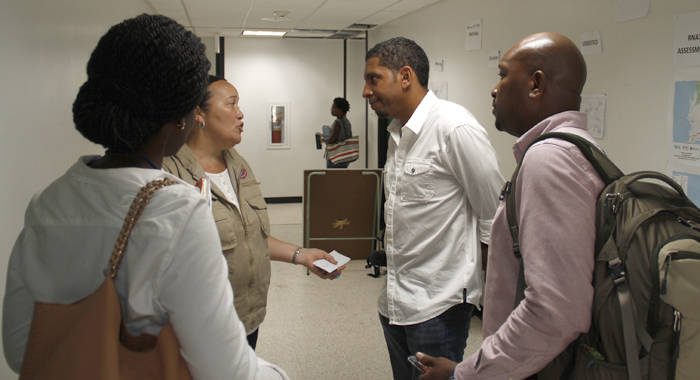By Kenton X. Chance
ROAD TOWN, British Virgin Islands (CMC) — The St. Vincent and the Grenadines government says it will use the feedback from meetings with its nationals in the British Virgin Islands (BVI) to determine the course of action it will take regarding repatriating them in the wake of the devastating Hurricane Irma last week.
Agriculture Minister Saboto Caesar, who along with Minister of Economic Planning, Camillo Gonsalves, Wednesday visited the BVI, told the Caribbean Media Corporation (CMC) that they were here to do critical assessments of the circumstances affecting their Vincentians.
About 10 per cent of the 30,000 residents of the BVI are nationals of St. Vincent and the Grenadines and some of them have lived in the British Overseas Territory more than three decades.
Caesar said that the Ralph Gonsalves government is particularly concerned about the education of the children, especially since Premier, D. Orlando Smith, informed the delegation that it could take some time for school to reopen.
“It is going to be a bit more time and we will converse with the parents and see what is really best in the circumstances for the students,” said Caesar whose delegation was scheduled to meet with Vincentians on Tortola and Virgin Gorda.
Hurricane Irma, a destructive category 5 hurricane, impacted the BVI on Sept. 6 with winds of 185mph, causing widespread damage to the road infrastructure, housing stock, ports, telecommunications, electrical infrastructure and critical facilities.
The storm claimed seven lives and left an indeterminate number of injured persons, disaster management officials said this week.
An estimated 351 people are being accommodated in 10 temporary shelters throughout the BVI and prior to impact, 106 of them were evacuated from Anegada, another island in the archipelago.
Preliminary assessments indicate that 60 to 80 per cent of the buildings in the BVI are damaged or destroyed with a large percentage of the building roofs being severely compromised.
Electricity generation, transmission and distribution infrastructure has been severely damaged and electricity is only being provided through generators.
Piped water facility is not functional due to the lack of electricity and there is a limited stock of potable water available
Caesar told CMC that he is aware that a lot of Vincentian parents in the BVI will be very occupied in the reconstruction process and it is going to be very difficult to sustain the welfare and the well-being of children at home if they are not in school.
“So I see that, in appropriate measure, we may have to accept more students at home,” Caesar said.
He said a number of Vincentians in the BVI have contacted the Ministry of education in St. Vincent and the Grenadines to inquire about the transfer of their students.
“And we will make sure that if there is going to be a movement of students into the system in St. Vincent and the Grenadines, in fact, we have a representative from the Minister of Education is here, … who is here to do that assessment to make sure that if there is a movement, that it is seamless.”
Gonsalves told CMC that Kingstown has to ensure that whatever it does is in the best interest of the individuals.
“St. Vincent and the Grenadines, as I indicated earlier, has a significant population in the BVI — about 10 per cent of the population. We don’t have, frankly, the capacity or the resources to instantaneously accept 2,500 residents or more into St. Vincent and the Grenadines,” said Gonsalves, who is also Minister of Sustainable Development.
“So we don’t want to make blanket commitments at this point. We want to do an evaluation,” he said, adding that Kingstown was heartened to know that most of the Vincentians want to stay in the BVI and rebuild.
“But we also know that there are particular instances of the children in school, or the elderly, who may require special care, of people who have constructed homes back in St. Vincent and the Grenadines with money that they have earned here in the BVI and have family members and it may be better for them to be in St. Vincent and the Grenadines.
“We want to do that assessment and approach it in a systematic, structured manner with some data. We don’t want to make blanket statements. We want to have some formal decision making and that’s why we are here,” Gonsalves added.
The ministers’ comments came one day after Vincent Whatley, a senior official of the BVI government with responsibilities for Virgin Gorda, Jos Van Dyke, and Anegada, suggested that non-nationals who cannot find work should leave the territory.
Gonsalves said that he was happy to learn that most of the Vincentians in the BVI see themselves as BV Islanders and see themselves as part of people who want to assist in the reconstruction.
He said that arrival in the BVI on Wednesday, he asked members of the team to make an assessment at the airport regarding the persons who were queuing up to leave and he was heartened that Vincentians are not among them.
Gonsalves said that most Vincentians have been significantly affected by the storm but want to stay to help in the recovery process.
“BVI has been kind to the people of St. Vincent and the Grenadines and we see that as an opportunity to repay that kindness,” he said.
The authorities in St. Vincent said that a boat will leave Kingstown on Friday to take supplies for nationals in the BVI. It will also make a stop in St. Lucia before arriving here four days later.






